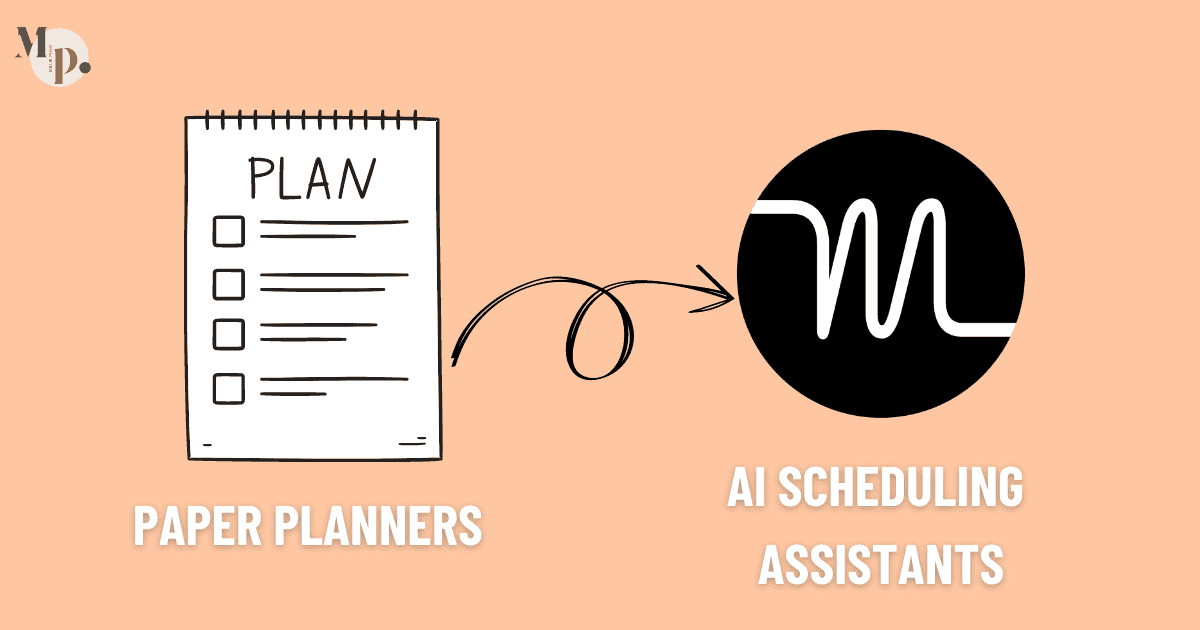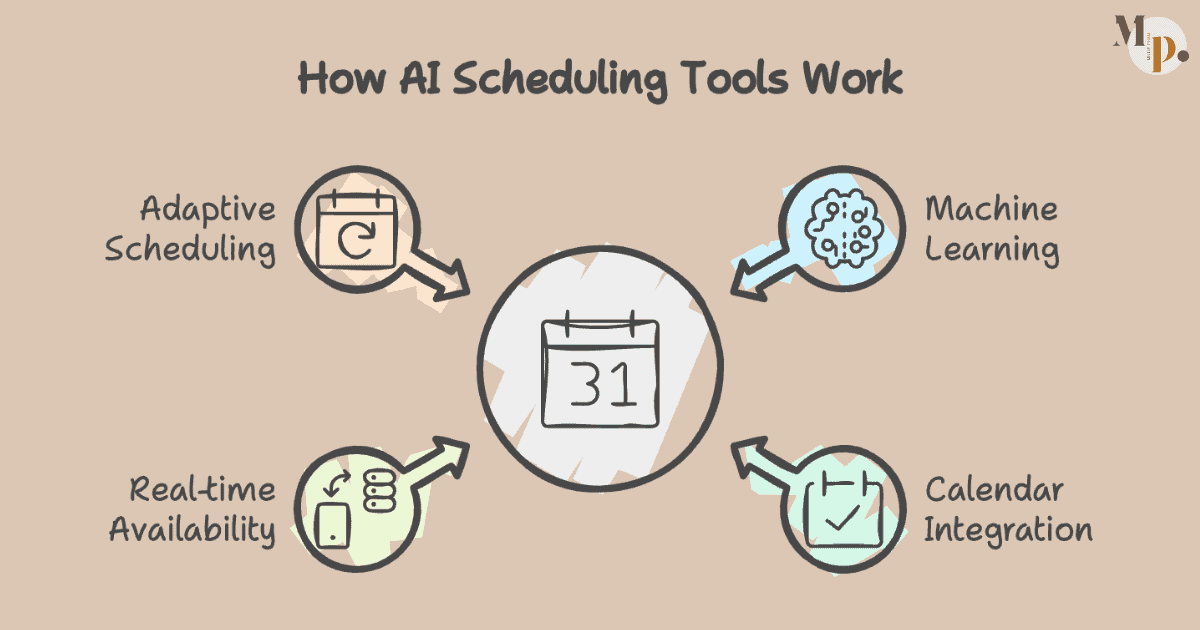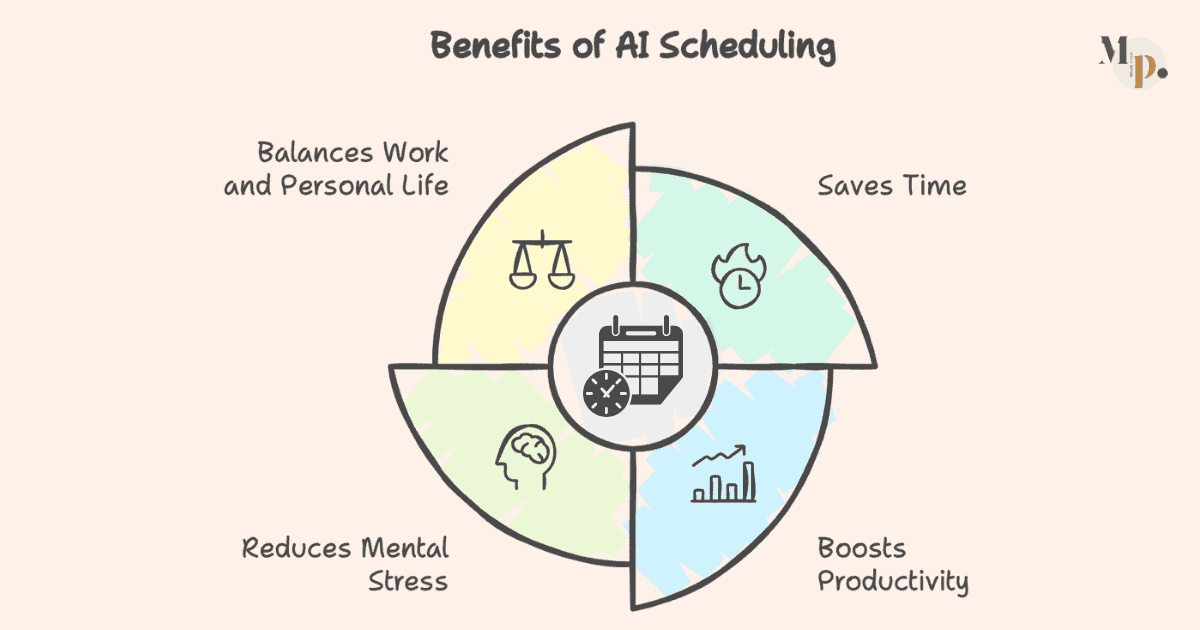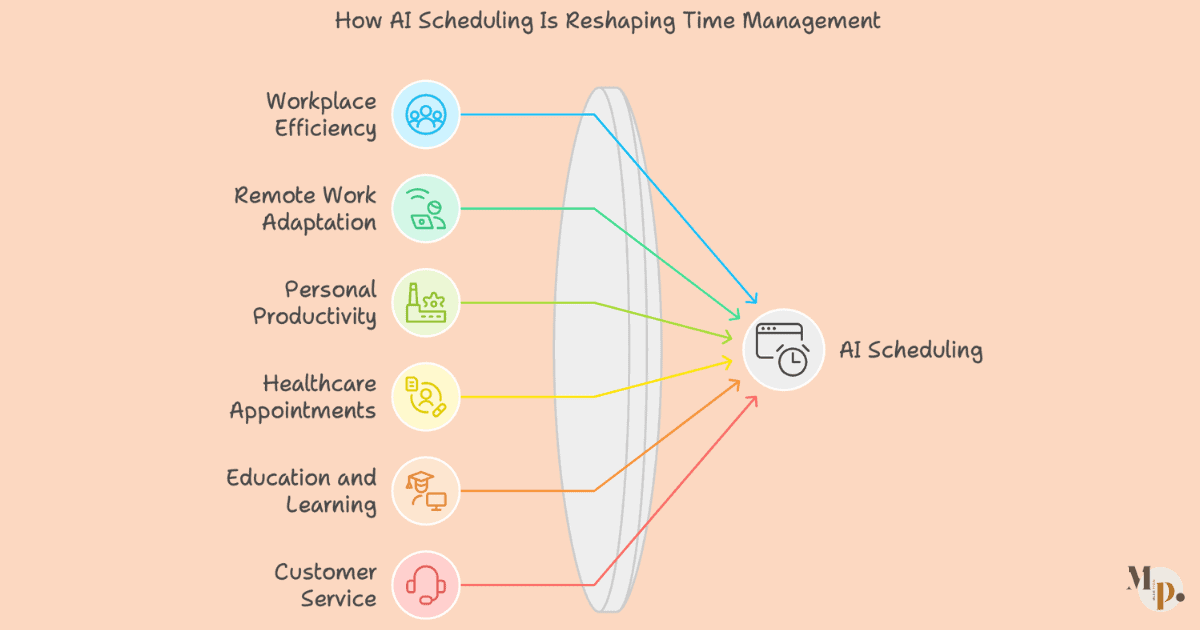Time is our most valuable resource, and managing it well can make a huge difference in our lives.
That's where AI scheduling comes in—a new way to handle time that's transforming how we plan our days.
Imagine having a smart assistant that not only keeps track of your appointments but also helps you organize your day based on what’s most important.
This isn’t science fiction; it’s happening right now!
In fact, Motion - one of the best AI scheduling apps, claims that their AI scheduling assistant can help you get 25% more tasks done. [1]
Want to know how it works and how it can help you?
Let’s explore the world of AI scheduling and its impact on time management.
The Journey of Time Management: From Paper Planners to AI Assistants

Time management has come a long way.
Remember when we used paper planners to keep track of our busy lives? We would write down appointments, to-do lists, and maybe even doodle in the margins.
But as life got busier, these planners started to feel a bit old-fashioned.
They couldn't adjust when plans changed, and it was easy to lose track of things.
Then came digital tools like online calendars and scheduling apps, which made things easier. But even these tools have their limits—they still require us to enter and update everything manually.
This is where AI scheduling steps in. Unlike traditional tools, AI assistants can learn our habits, predict our needs, and automatically update our schedules.
They handle the tedious tasks of organizing, freeing us up to focus on what really matters.
Over the years, there have been key moments in AI development, from simple auto-schedulers to advanced systems that can sync with our entire digital life.
These milestones have made AI scheduling a powerful tool in managing our time more efficiently.
How AI Scheduling Works: The Technology Behind the Magic

AI scheduling tools use advanced technology to help you manage your time better.
They rely on machine learning, which means they learn from your habits—like when you usually set up meetings or how you like to plan your day.
Over time, these tools better predict the best times for your tasks and appointments.
These AI tools can connect directly to your existing calendars like Google Calendar or Outlook, keeping all your plans in one place.
This helps them check your availability in real-time, so they can avoid double-booking you or missing out on important meetings.
AI scheduling tools can also adjust your schedule on the fly. If something changes—like if a meeting gets canceled or you finish a task early—the tool can quickly reschedule things to keep your day running smoothly.
Some examples of popular AI scheduling tools include Reclaim AI (Review here) and Motion (Review here). These tools not only handle basic scheduling but also learn from how you use them, making them more helpful the more you interact with them.
Benefits of AI Scheduling for Daily Life and Work

Saves Time
AI scheduling tools help you save a lot of time by automatically setting up your meetings, tasks, and appointments.
Instead of going back and forth to find the right time, the AI does it for you, so you can use your time more wisely.
Boosts Productivity
These tools help you get more done by organizing your tasks in a way that makes sense.
They look at when you're most productive and suggest the best times to work on certain tasks, so you can be more efficient and get more accomplished.
Reduces Mental Stress
AI scheduling reduces the stress of constantly making decisions about your schedule.
It takes care of the routine stuff, like figuring out when to have meetings or do tasks, so you don’t have to think about it as much. This helps you save mental energy for more important things.
Balances Work and Personal Life
By managing your time better, AI scheduling helps you balance work and personal life well.
It makes sure you have time for work but also for breaks and personal activities, which helps you stay refreshed and avoid burnout.
How AI Scheduling Is Reshaping Time Management

AI Scheduling at Work: Improving Team Efficiency
AI scheduling is changing the way teams work by making it easier for them to collaborate.
These tools automatically find the best times for meetings, considering everyone's availability and preferences.
This saves time and cuts down on the back-and-forth emails that can slow down team projects.
Companies like Motion use AI to check team calendars and tasks, helping to avoid scheduling conflicts and ensuring meetings are set at the best times.
Over time, these tools learn from the team's habits to make even better scheduling choices.
Another tool, Lindy, schedules meetings and helps with to-do lists and project timelines, keeping everything organized.
Reclaim is another example, which automates routine scheduling and suggests changes to prevent overlaps, letting teams focus more on their work.
AI scheduling tools are expected to become even more useful in the future by offering real-time updates, automated project planning, and deeper insights into team productivity.
This will help teams work more efficiently and get more done
AI Scheduling for Remote Work: Adjusting to the New Way of Working
Managing time effectively in remote work can be tough. Without a traditional office structure, it’s easy for meetings to overlap, tasks to pile up, and work-life balance to blur.
This is where AI scheduling tools come in handy. These tools help you organize your day by automatically setting up meetings, blocking out focus time, and reminding you of important tasks.
They can even adjust your schedule in real time if something changes, making sure you stay on track.
To maximize AI scheduling in your remote work routine, start by integrating the tool with your existing calendar and task management apps.
Set clear preferences for your work hours and break times, so the AI knows when to schedule meetings and when to leave you uninterrupted.
Also, regularly review and tweak the AI's settings to ensure it aligns with your current workload and priorities.
However, be mindful of potential pitfalls, like over-relying on automation, which can lead to a rigid schedule that doesn’t allow for flexibility.
To avoid this, always double-check the AI's suggestions and be ready to adjust them based on your daily needs.
By using AI scheduling tools thoughtfully, you can create a more balanced and efficient remote work experience.
AI Scheduling for Personal Productivity
AI scheduling tools are great for boosting your personal productivity. They help you manage your to-do lists, set reminders for important events, and even schedule time for hobbies and self-care.
By automatically organizing your day, these tools make sure you have enough time for both work and personal activities, which helps you maintain a healthier balance.
For example, tools like Reclaim AI and Motion analyze your calendar and habits to find the best times for focused work, meetings, and personal tasks.
Reclaim AI even blocks out "Focus Time" for distraction-free work sessions, which is essential for staying productive.
According to users, these tools can save hours each week by reducing the need for manual schedule adjustments and helping you stick to your priorities.
These AI tools are designed to learn from your routines, making them smarter and more personalized over time.
This means that the more you use them, the better they get at helping you manage your time effectively, ensuring you’re working on the right things at the right times
AI Scheduling for Healthcare Appointments
Managing multiple medical appointments can be stressful, especially when coordinating with different doctors and keeping track of follow-ups and medication schedules.
AI scheduling tools can really help with this. They automatically arrange your appointments, make sure there are no overlaps, and even send you reminders for upcoming visits and medications, making it much easier to manage your healthcare.
For example, Northwell Health, a large hospital system, used an AI scheduling system that led to 20% fewer scheduling conflicts and a 15% increase in staff satisfaction. [2]
This system also allowed nurses to spend more time with patients, improving the overall quality of care.
Another healthcare provider saw their appointment bookings jump from 5.7% to 14% in just six weeks after they started using an AI scheduling tool. [3][4]
These examples show that AI is already making a big difference in healthcare.
By taking care of scheduling, these tools allow doctors and nurses to focus more on patient care, leading to better outcomes and a more efficient healthcare system
AI Scheduling for Education and Learning
AI scheduling is really helping both students and teachers manage their time better.
For students, these tools can help organize study schedules, keep track of deadlines, and help with group projects.
This makes it easier for students to stay on top of their work without getting too stressed.
For teachers, AI can schedule classes, office hours, and grading times more effectively, allowing them to focus more on teaching.
As AI continues to be used more in schools, these tools are expected to become even more important in helping education run more smooth
AI Scheduling for Customer Service
AI scheduling is improving customer service by automatically assigning tasks and scheduling calls.
This means customers get quicker service because they are connected to the right agents who have the necessary skills to resolve their issues.
The result is a smoother and more efficient experience for customers.
AI scheduling also cuts down on the time teams spend on manual scheduling, allowing them to concentrate more on actually helping customers.
This not only enhances the quality of service but also enables teams to handle more customer requests more efficiently.
Conclusion:
AI scheduling is reshaping time management by changing the way we organize our lives.
These tools are more than just a trend—they represent a new way to manage our most valuable resource: time.
As AI scheduling tools become more advanced, they offer us unique opportunities to streamline our daily tasks, boost productivity, and achieve a better balance between work and personal life.
However, with these powerful tools comes the responsibility to use them wisely.
As we continue to integrate AI into our routines, it's important to stay informed, make thoughtful choices, and customize these tools to meet our specific needs.
Ready to see how AI scheduling can transform your time management? Start exploring these tools (my recommendation: Motion) today and experience the difference they can make!
